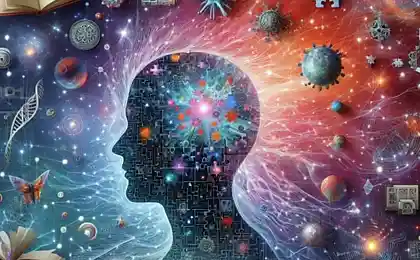279
A guide to psychology. Issue 5. Personality: Why We Are So Different
Description: In this article, we will examine how unique personality is formed and why people are so different from each other. The author analyzes the influence of genetics, environment and individual experience, and also talks about various theories explaining the uniqueness of the human “I”.
List of all articles in the cycle

Introduction
We are all familiar with the situation when children grow up in a very different family.
Or when close friends, having similar hobbies, show contrasting personality traits.
Why is one person naturally sociable and friendly, while another is reserved and focused on his own inner world?
Is it possible to speak of an innate temperament, or are all our differences the result of upbringing and cultural norms?
Psychology theme uniqueness One of the most important and difficult.
Since the days of ancient philosophy, people have tried to explain why we acquire our unique totality.
character traits and behaviors. Modern research takes into account several factors:
genetic predispositions, environmental influences, cognitive attitudes and personal life experiences.
But if we boil it down to biology or parenting, we miss that fine line of human individuality.
It makes each of us so unique.
In this article, we will look at what mechanisms determine our individual differences.
How personality traits are formed and why some people become leaders.
Others prefer to stay in the shadows. We will also touch upon popular theories of personality and show that
How understanding your own characteristics helps not only in self-realization,
It's also about building deeper relationships with others.
Main part
Genetics and temperament: the legacy of ancestors
One of the key questions in psychology is the relationship between innate factors and the influence of the environment.
Many scientists have pointed out that temperament the dynamic side of the personality, manifested in the speed of reactions,
Emotional excitability and energy - has genetic roots.
Classical teachings (for example, Hippocrates' theory of the four types of temperament - choleric, sanguine, melancholic, phlegmatic)
It is now seen more as a metaphor or a convenient typology, but modern research confirms that
Children are already born with a different level of activity, frequency of smiles, a tendency to fear.
Of course, heredity does not determine personality. The genetic code only sets certain limits.
within which our character is manifested. Some people are born with greater sensitivity to external stimuli.
Others have a more stable nervous system. But what we call a "unique style of behavior."
It will develop under the influence of a number of additional factors - from upbringing to personal choice in a particular situation.

Environmental Impact: Family Atmosphere and Social Factors
The family is the first and most important “social laboratory” in which the basic ideas of man about the world are formed.
It is in childhood that we adopt patterns of behavior of parents and loved ones, assimilate values and norms.
We also learn to respond to difficulties and conflicts. Moreover, the order of birth (older or younger child),
The number of brothers and sisters and even the living space will affect how it will develop. personality.
Psychologist Alfred Adler believed that the position of the child in the family has a significant impact on his further social activity.
Self-esteem and leadership skills.
The social environment outside the family (kindergarten, school, yard, sports sections) also plays a big role.
There we meet with the first competition, learn to establish relationships, learn about the existence of different characters and worldviews.
If a child grows up in an atmosphere of support and respect, he develops healthy self-esteem and self-confidence.
On the contrary, if the environment is prone to fierce competition, depreciation or aggression, a person can grow up closed.
suspicious and prone to distrust.
Growing up, we continue to face new teams and “social frameworks” – at work, at university.
in professional communities. At these stages, additional aspects of our personality are formed:
Leadership qualities, communication skills, ability to cope with stress. So, one man, once a timid teenager,
can open up in the student team and gain the charisma of the leader, and the other, on the contrary, remaining active in childhood,
They lose enthusiasm over time due to fierce competition or unreasonable expectations.
Psychological theories of personality: a view from different sides
There are many scientific schools that attempt to systematize individual differences.
Consider some of the most influential areas:
- Psychoanalytic approach (Z. Freud, K. G. Jung). The role of unconscious processes,
Children's memories and internal struggle of motives in the formation of personality. - Humanistic Psychology (K. Rogers, A. Maslow). He believes that everyone has a desire to
Self-actualization and personal growth; uniqueness is determined by how we reach our potential. - Hell Theory (G. Allport, R. Kettel, the Big Five model).
Attempts to describe the personality as a set of certain characteristics characteristic of a person to various degrees
(Extroversion, goodwill, conscientiousness, etc.). - Socio-cognitive approach (A. Bandura, U. Michel). Focusing on how thinking,
environment and behavioral patterns mutually influence each other, forming individual strategies of behavior.
Some scientists focus on inner mental conflicts, others on innate traits.
The third is the interaction of the individual with the social environment. Together, all of these factors create a unique “personality code.”

The Practical Value of Personality Knowledge
A conscious understanding of one’s own characteristics and respect for the characteristics of others helps:
- Improve communication. When we realize that the other person may have a different type of temperament or value,
We stop judging his actions through a right/wrong lens and learn to compromise. - Develop talents and soften weaknesses. A clear understanding of personal strengths
(for example, creativity, perseverance, empathy) allows you to use them effectively in your work and personal life.
At the same time, you can “pump” what is more difficult. - Building healthy boundaries. Knowing your vulnerabilities and knowing that other people have them,
We become more tolerant and cautious in actions that may hurt someone's feelings. - Deal with stress and conflict. Understanding the diversity of individuals provides a tool
for a more flexible response: someone works better under tight deadlines, and someone needs a calm environment.
It contributes to social environments, collectives and even global culture.
The uniqueness of the individual is not just a scientific hypothesis, but a reality.
It defines the diversity of human roles and the contribution of each individual to the common life of the planet.
Conclusion
“Why are we so different?” is a question that is relevant at all times.
On the one hand, our personality is laid by natural data, on the other – polished by experience, environment and personal choice.
The combination of innate qualities, cultural influences and life situations produces an infinite variety of characters and behaviors.
That is why we cannot reduce human individuality to a single explanation: it is like a kaleidoscope.
where each facet reflects the rays in its own unique pattern.
Understanding the nature of this uniqueness It makes us more sensitive to other people and opens the way to self-development.
The deeper we become aware of our traits, the clearer we see how to build a harmonious life: from choosing a profession to building close relationships.
And when we realize that others may have different mechanisms of perception, we learn patience and flexibility in communication.
The absence of a “single formula” does not mean that the uniqueness of a person cannot be investigated.
On the contrary, modern psychology has many theories and practices that allow one to know and develop oneself.
And most importantly, human diversity is not a problem, but the richness of our common world, stimulating culture, science, art.
and everything that makes human life bright and multifaceted.
Glossary
Temperament.
Biologically determined basis of individuality, manifested in the dynamics and emotionality of behavior.
Genetic code
A set of hereditary factors that are inherited and affect the formation of the body and psyche.
Identity
A person’s sense of their own uniqueness and belonging to certain social or cultural groups.
The Theory of Hell (The Big Five)
An approach that describes personality through several stable characteristics: extraversion, benevolence, conscientiousness, neuroticism, and openness to experience.
Birth order
The concept in psychology, which implies that the position of the child in the family (senior, middle, junior) affects his personality traits and behavior.
Alfred Adler
A well-known Austrian psychologist and psychiatrist, one of the founders of deep psychology, who paid special attention to the social nature of man.
A guide to psychology. Issue 4. Society and Culture: The Unwritten Rules of the Human World
A guide to psychology. Issue 6. “Family and Parents: How Our Individuality Is Formed”























